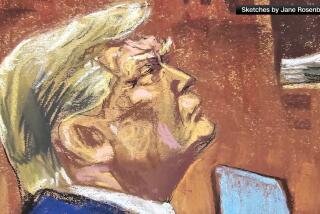Is It the Right Verdict? Well, It’s All Relative
- Share via
It will be a verdict to fit our times. It is perhaps only appropriate that the “trial of the century” will end in a hung jury. As the final tally is called in the Clinton trial, we are left with a president retained not by acclamation but by default. There can be no feeling of accomplishment or satisfaction, no central truth revealed or restored. It is ending with all of the uncertainty and ambiguity of our time, a mere fade-out to regular programmming.
Ironically, President Clinton had promised to “build a bridge to the 21st century,” and this trial may symbolize that millennium change more than any other event in his two terms. This verdict would have been different had it occurred at the beginning of this century rather than at the end, not because constitutional standards have changed but because we have changed. We have become a nation of moral relativists who view absolutes as archaic and extreme.
The trial brought a new meaning to Clinton’s inaugural warning that, in building this bridge, we will need “a new vision of government, a new sense of responsibility . . . to sustain America’s journey.”
It may be that some of us are stuck in the 18th century, but, as someone who voted for Clinton, I cannot help but be concerned with what we are leaving behind in the journey into the new millennium. This trial has been different from past impeachment trials. Where past trials focused on conduct, this trial focused on characters. It was like a morality play with central figures but no central moral.
From the outset, the White House portrayed this scandal as a contest of personalities rather than principles. Ken Starr was the evil pursuer supported by a “vast right-wing conspiracy.” Monica Lewinsky was “a stalker.” Tripp was “a betrayer.” It is a cult of personality that plays to a TV audience.
Indeed, at times, trial coverage appeared more like character development than case development. Consider the description of Lewinsky by the Associated Press after her recent deposition detailing a pattern of deceit and amoral judgments: “Monica Lewinsky dipped her head, ebony hair falling over her face. Vernon Jordan once teased her about being in love with the president, she recalled. A smile of fond reminiscence lifted her glossed lips.” Other such breathless accounts included suggestions that Lewinsky was a “poised,” “polished,” “impressive,” “inspiring” young woman who should go into “media,” “law school” or “public speaking.”
In our political evolution, we have become more interested in how people do in a scandal than how they got there. What is missing is any judgment of the underlying conduct or decisions of the individual. We have become a nation of onlookers detached from the story while engrossed in the scene.
For those of us who feel like road kill on the bridge to the 21st century, today’s expected verdict may show that we are simply unprepared for the new millennium. It is not that we miss the morality of the 18th century, only its clarity. Our mistake was to put on trial a 21st century president with the expectations of an 18th century Constitution.
President Clinton has long defined morality by its consequences rather than the content of his actions, and the trial quickly took on his image. There is no expectation of a meaningful conclusion; only a conclusion, one that is all but preordained. It is like watching a slow car crash--we know the outcome before the verdict. It is unthinkable that many Democrats will vote against such a popular president. Such a suggestion was dismissed long ago by pundits as naive, and we certainly are not living in naive times. We are living in Clintonian times.
For those of us who believe that Clinton has committed crimes in office, the morning after the trial will remain somewhat disorienting. While we understood the political realities and anticipated the result, there remains a conceptual divide with the majority of the public in how this president could possibly have been retained. The feeling of confusion and betrayal among some Americans reflects the fact that this verdict says less about Clinton than it does about us.
The decision reflects our lowered expectations of our leaders. Any society is ultimately defined by a small number of absolutes, principles that are inviolate. Otherwise, politics is merely a process of achieving the convenient or the satisfying. In the 18th century, politics was a process of definition of the essentials of citizenship and virtue. The framers denounced relativism in every form.
In the dawn of a new century, such views are quaint but hardly relevant. They have become constitutional sound bites in a new morality play. It is a play written by our president to fit our times, “full of sound and fury signifying nothing.”
More to Read
Sign up for Essential California
The most important California stories and recommendations in your inbox every morning.
You may occasionally receive promotional content from the Los Angeles Times.













